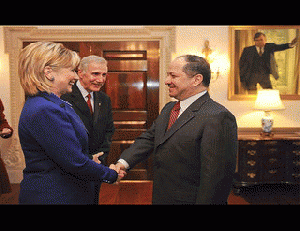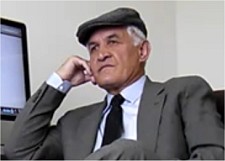By Hamma Mirwaisi and Alison Buckley

President Barzani's Meeting With the US Secretary of State Hillary Clinton
(Image by Hamma Mirwaisi) Details DMCA
Former President Bill Clinton's health problems may be symptomatic of the stress he endured while leading his country and making some decisions that hardened the hearts of many Kurdish people against the United States. U.S. policy aiding the Turks against the Kurds in Turkey has indicated significant disrespect for the Kurdish people's human rights. Now the American people must ask what they will gain from the ongoing use of their sophisticated technology in Turkey against a people who are already suffering under the dictates of an abusive Islamic backed state. The policy is yet another imposition on the Kurdish people and their revolution under the leadership of the Kurdistan Worker's Party (PKK) and Abdullah Ocalan, who have never hurt the American people and their interests in Turkey and the Middle East, in spite of the U.S. government's creation of regimes in Iraq that have appropriated Kurdish oil wealth and left most of the people impoverished.
Since its creation, the Republic of Turkey carried out a vendetta against the Kurdish people. Because the US Government kept knowledge of this policy from the American people, it is understandable that many Americans are content to let their government, especially their presidents, act all powerfully in the affairs of other nations in the name of that office. But former President Clinton exceeded his commission by chaining Abdullah Ocalan, leader of fifty million Kurds, and handing him to Turkey, after which Clinton's state department admitted the technological superiority of the U.S. over the disadvantaged Kurdish people's ability to challenge its power.
But delusions of universal grandeur and control will not perpetually sustain the predominantly Judeo-Christian based power of the U.S. The Kurdish people belong to another great, monotheistic empire that ruled the Middle East two thousand five hundred years ago, an empire which in the context of today's chaos in the region is predicted to return in the Hebrew Tanakh. Professing a belief in its veracity, American presidents, past and present, would do well to note that this return must happen before the Messiah's feet touch the Mount of Olives, and to further note the predicted end of the Kurdish people's deprivation and suffering imposed by the Persians, Arabs and Turks in a fiery battle, a battle already begun.
Massively armed superpowers like the U.S. are no match for the God of Kurdistan, who has traditionally watched over the Median (ancient Kurdish) Empire's occupation by the Persians, Arabs and Turks since 500 BCE. While the modern 1975 Algiers Agreement has seen the incremental demises of the leaders who created it, from the Shah of Iran through former President Richard Nixon to Saddam Hussein, the Medes' God of fire sheds light on the Kurdish military forces' increasing successes in their wars with the Turkish, Persian and Arab occupiers of their lands.
The provisions which have caused these wars are described below:
"The 1975 Algiers Agreement (commonly known as the Algiers Accord, (sometimes as the Algiers Declaration) was an agreement between Iran and Iraq to settle their border disputes (such as the Shatt al-Arab --known as Arvand Rud in Iran-- and Khuzestan), and served as basis for the bilateral treaties signed on 13 June and 26 December 1975. Less than six years after signing the treaty, Iraq attacked Iran to invade her borderlands. The primary motivating factor behind the Iraqi invasion under Saddam Hussein was to annex and incorporate the oil-rich Iranian state of Khuzestan as Iraqi territory. However, that invasion was quickly countered with fierce resistance by Iranian military. The Iran--Iraq War lasted eight years, and finally ended with a United Nations brokered ceasefire in the form of United Nations Security Council Resolution 598, which was accepted by both sides. Friction remains along the border, despite the currently binding treaty and its detailed boundary delimitation remaining in force since it was signed by both nations in 1975 and ratified by them in 1976. Under international law, one nation cannot unilaterally reject a previously ratified treaty, and the treaty had no clause providing for abrogation by one nation only."
The outcome of the agreement overseen by President Nixon was supported by President Clinton and his successor, President Bush, both of whom's policies are discussed below.
Are Barzani's Oil Deals in Kurdistan in Danger of a Takeover Bid?
After the first Persian Gulf War, the Barzani and Talabani families took over the government of Northern Iraq to form the Kurdistan Regional Governments (KRG). With subsequent conflicts in the area, millions of Kurdish refugees in Turkey, Iran, and nearby mountains became afraid of an Iraqi chemical attack, which led to the western countries' protection of Kurds in Iraq, Turkey, Iran and Syria.
The Barzani and Talabani family members used their Peshmerga militia advantageously to control the Kurdish people's oil fields in the Kurdistan region. After selling the oil to Turkey, Iran and the western countries without respect for laws providing for the equitable dispersal of a country's wealth to its people, they became armchair billionaires and millionaires.
The background is documented below.
"Iraqi leader Saddam Hussein ordered the invasion and occupation of neighboring Kuwait in early August 1990. Alarmed by these actions, fellow Arab powers such as Saudi Arabia and Egypt called on the United States and other Western nations to intervene. Hussein defied United Nations Security Council demands to withdraw from Kuwait by mid-January 1991, and the Persian Gulf War began with a massive U.S.-led air offensive known as Operation Desert Storm. After 42 days of relentless attacks by the allied coalition in the air and on the ground, U.S. President George H.W. Bush declared a cease-fire on February 28; by that time, most Iraqi forces in Kuwait had either surrendered or fled. Though the Persian Gulf War was initially considered an unqualified success for the international coalition, simmering conflict in the troubled region led to a second Gulf War--known as the Iraq War--that began in 2003." (2)
(Note: You can view every article as one long page if you sign up as an Advocate Member, or higher).





